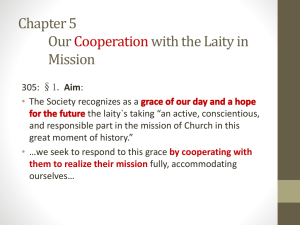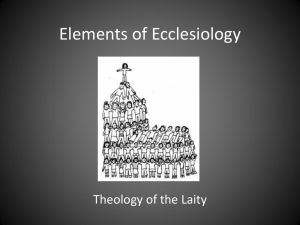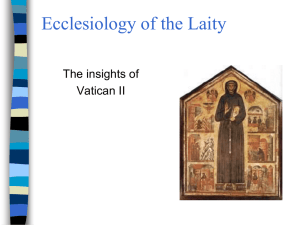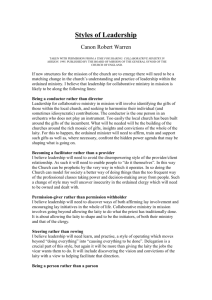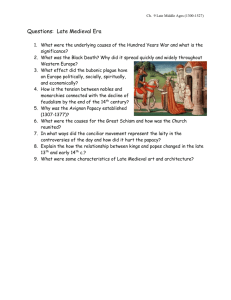Jordan Aumann, O.P. The Christian Laity From: PHILIPPINIANA
advertisement
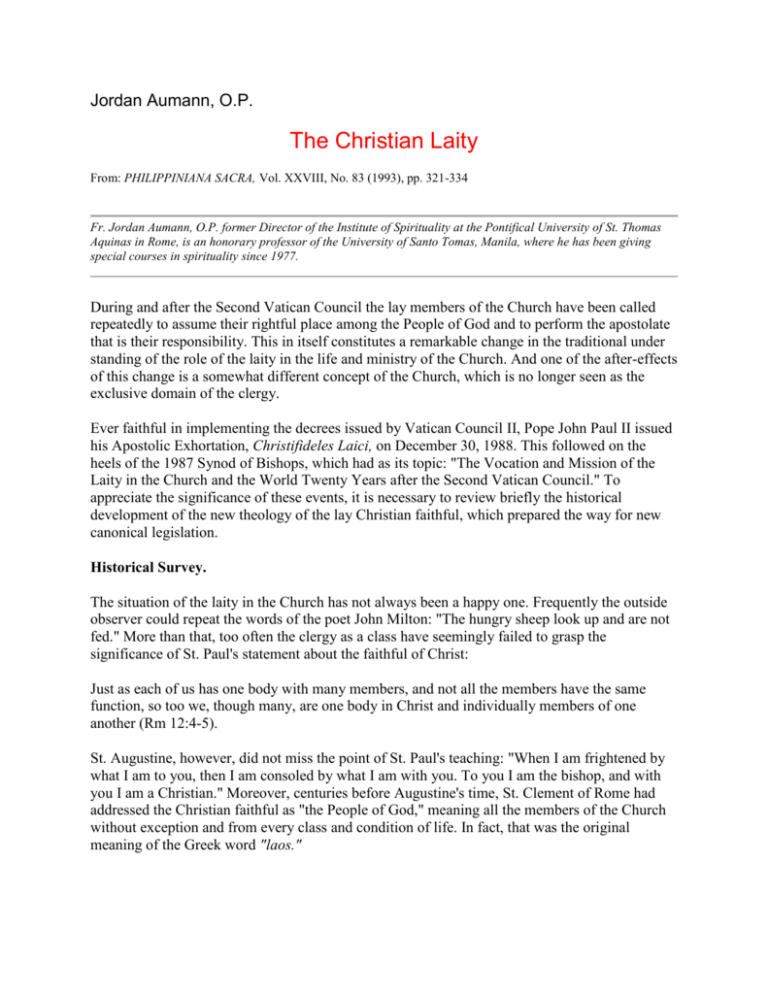
Jordan Aumann, O.P. The Christian Laity From: PHILIPPINIANA SACRA, Vol. XXVIII, No. 83 (1993), pp. 321-334 Fr. Jordan Aumann, O.P. former Director of the Institute of Spirituality at the Pontifical University of St. Thomas Aquinas in Rome, is an honorary professor of the University of Santo Tomas, Manila, where he has been giving special courses in spirituality since 1977. During and after the Second Vatican Council the lay members of the Church have been called repeatedly to assume their rightful place among the People of God and to perform the apostolate that is their responsibility. This in itself constitutes a remarkable change in the traditional under standing of the role of the laity in the life and ministry of the Church. And one of the after-effects of this change is a somewhat different concept of the Church, which is no longer seen as the exclusive domain of the clergy. Ever faithful in implementing the decrees issued by Vatican Council II, Pope John Paul II issued his Apostolic Exhortation, Christifideles Laici, on December 30, 1988. This followed on the heels of the 1987 Synod of Bishops, which had as its topic: "The Vocation and Mission of the Laity in the Church and the World Twenty Years after the Second Vatican Council." To appreciate the significance of these events, it is necessary to review briefly the historical development of the new theology of the lay Christian faithful, which prepared the way for new canonical legislation. Historical Survey. The situation of the laity in the Church has not always been a happy one. Frequently the outside observer could repeat the words of the poet John Milton: "The hungry sheep look up and are not fed." More than that, too often the clergy as a class have seemingly failed to grasp the significance of St. Paul's statement about the faithful of Christ: Just as each of us has one body with many members, and not all the members have the same function, so too we, though many, are one body in Christ and individually members of one another (Rm 12:4-5). St. Augustine, however, did not miss the point of St. Paul's teaching: "When I am frightened by what I am to you, then I am consoled by what I am with you. To you I am the bishop, and with you I am a Christian." Moreover, centuries before Augustine's time, St. Clement of Rome had addressed the Christian faithful as "the People of God," meaning all the members of the Church without exception and from every class and condition of life. In fact, that was the original meaning of the Greek word "laos." By the third century, however, with ecclesiastical writers like St. Cyprian, Tertullian and Origen, the word no longer applied to all the People of God, but only to those who were not in holy orders; hence the division of the members of the Church into clergy and laity. This manner of speech is readily understandable when we reflect that even today in popular speech we speak of "the government and the people"; and therefore one could also say: "the hierarchy and the people (laos)." By the time of the Council of Trent (1545-1563) the Church was described as a perfect but unequal society, and this led not only to an emphatic distinction between clergy and laity, but it also placed great emphasis on ecclesiastical authority and the obedience required of the laity. In due time the institutional, hierarchical aspect of the Church was predominant, while the ordinary laity were left in the shadows. No wonder, then, that the Church was seen by many as the domain of the clergy. Various factors were involved in this "clericalization" of the Church and not least among them was the necessity of defending the traditional sacramental theology of the Church -- especially concerning the Eucharist and the sacrament of Holy Orders. At the risk of oversimplification, we may say that Martin Luther and the other Protestant reformers introduced "congregationalism," that is, control of the churches and the pastors by the laity, with the result that the ministry of their clergy was for all practical purposes restricted to preaching. In all fairness it should be noted that the Catechism of the Council of Trent explicitly stated that the word "Church" must never be understood as applying exclusively to the hierarchy. But even before the Protestant Reformation, the Church had to defend her freedom and the authority of her hierarchy against the excessive demands of the laity in the name of equality and against the unlawful interference of secular power in ecclesiastical and spiritual matters. Thus, Pope Boniface VIII (1294-1303) had to issue a strongly worded document in which he stated: Antiquity has often taught what the experience of the present time manifestly demonstrates: that the laity are often enemies of the clergy, because, not content with their own limits, they seek to obtain that which is forbidden, rejecting that which should restrain them in order to obtain that which is not permitted, and not judiciously considering that they are forbidden all power over clerics or ecclesiastical goods and persons. They rather impose heavy burdens on prelates of the Church, on churches and ecclesiastical personages, both regulars and seculars. (Clericis laicos, 1266). Closer to our own times, Pope Gregory XVI (1831-1846) stated: "No one can deny that the Church is an unequal society in which God has destined some to command and others to obey." Pope Leo XIII (1878-1903) also declared that there are two distinct classes in the Church: pastors and their flocks, the leaders and the people. "The role of the first order," he said, "is to teach, to govern and to lead men in life; to impose rules. The duty of the other is to submit itself to the first, to obey it, to carry out its orders and to honor it." And yet it is this same Pontiff who said that "when circumstances make it necessary, it is not prelates alone who have to watch over the integrity of the faith. As St. Thomas says: 'Everyone is bound to show forth his faith publicly, whether for the instruction and encouragement of other faithful or to repel the onslaughts of adversaries'." During that same period of history Cardinal Newman (1801-1890) made a strong plea for the education of the Catholic laity and even urged that competent laity should be consulted in matters of doctrine. Unfortunately, due to the climate in Rome at the time, Newman's ideas were not only rejected but he himself was placed under a cloud as regards his orthodoxy. Thus, Monsignor Talbot wrote from Rome to Cardinal Manning: "If a check is not placed on the laity of England, they will be rulers of the Catholic Church in England instead of the Holy See and the episcopate... What is the province of the laity? To hunt, to shoot, to entertain. These matters they understand; but to meddle with ecclesiastical matters they have no right at all, and this affair of Newman is a matter purely ecclesiastical... Dr. Newman is the most dangerous man in England, and you will see that he will make use of the laity against Your Grace." Cardinal Newman has been amply vindicated by subsequent teaching on the role of the laity, promulgated by Pope Pius X (1903-1914), Pope Pius XI (1922-1939), and Pope Pius XII (19391959). These three Popes were the outstanding promoters of participation of the laity in the mission of the Church, together with St. Vincent Pallotti (1795-1850), the founder of the Society for Catholic Action. In our own day the teaching of the second Vatican Council on the laity and the revised Code of Canon Law have undoubtedly leaned heavily on the preliminary work done by theologians such as Yves Congar, O.P., Raymond Spiazzi, O.P., and Cardinal Jerome Hamer, O.P. Nor can we forget the influence of Monsignor Josemaría Escrivá, the founder of Opus Dei, and his successor, Alvaro Del Portillo. As early as 1932 Monsignor Escrivá made the following statement: The prejudice that ordinary members of the faithful must limit themselves to helping the clergy in ecclesiastical apostolates has to be rejected. There is no reason why the secular apostolate should always be a mere participation in the apostolate of the hierarchy. Secular people too have to have a duty to do apostolate; not because they receive a canonical mission, but because they are part of the Church. Their mission... is fulfilled in their professions, their job, their family, and among their colleagues and friends. (Reported in the book, Conversations with Msgr. Josermaría Escrivá, Dublin, 1968, p. 32). Contemporary Church Teaching. The Second Vatican Council (1962-1965) spoke so frequently about the laity -- especially in the "Dogmatic Constitution on the Church" (Lumen Gentium), the "Decree on the Apostolate of the Laity" (Apostolicam Actuositatem), and the "Pastoral Constitution on the Church in the Modern World" (Gaudium et Spes) -- that it has been called "the Council on the Laity." At the same time it presented a new approach to ecclesiology by discussing so frequently the vocation and mission of the laity and by reviving the concepts of the Church as a mystery, a sacrament and the People of God. Pope John Paul II has stated that the Church is "mystery because the very life of the Father, Son and Holy Spirit are the gift gratuitously offered to all those who are born of water and the Holy Spirit (cf. in 3:5), and called to live the very communion of God and to manifest it and communicate it in history (mission)" (Christifideles Laici, 8). The Church is sacrament because it is a visible sign instituted by Christ to give its members the divine life of grace and thus bring them into communion with the Trinity. Finally, the Church is the People of God because through the one faith and the one baptism they are reborn as children of God and are incorporated into Christ's priestly, prophetic and kingly functions, each one according to his or her condition or state of life. During the pontificate of Pope Pius XII it became very popular to speak of the Church as the Mystical Body of Christ, thus delineating the variety of functions performed by the various members of the Church. Yet, Pope Pius XII did not have an either-or mentality; rather, he likewise acknowledged the concept of the basic equality of the faithful as the People of God: When the Fathers of the Church sing the praises of this Mystical Body of Christ,... they are thinking not only of those who have received holy orders, but of all those who, following the evangelical counsels, pass their lives either actively among men or hidden in the silence of the cloister or who aim at combining the active and contemplative life according to their institutes; as also of those who, though living in the world, consecrate themselves wholeheartedly to spiritual and corporal works of mercy, and of those who live in the holy state of matrimony. Indeed, let this be clearly understood, especially in these our days: fathers and mothers of families, those who are godparents through baptism, and in particular those members of the laity who collaborate with the ecclesiastical hierarchy in spreading the kingdom of the divine Redeemer, occupy an honorable, if often a lowly, place in the Christian community, and even they, under the impulse of God and with his help, can reach the heights of supreme holiness which, Jesus Christ has promised, will never be wanting to the Church. (Mystici Corporis, 8, 1943). In a letter dated February 2, 1945, Monsignor Escrivá, a truly prophetic forerunner of the Second Vatican Council's teaching on the laity, discussed the same topic in these words: To fulfill the demands of the Christian vocation which they live in common, and as something required of them by the same baptism which they have both received, priest and layman must both aspire equally to sanctity... The holiness to which they are called is no greater in the priest than in the layman, for the layman is not a second-rate Christian. Holiness, in the layman just as in the priest, is nothing other than the perfection of the Christian life, the fullness of divine sonship, for in the eyes of our Father God we are all of equal standing, whatever be the function or ministry assigned to each one: little children for whom, precisely because they are little, the kingdom of heaven has been reserved (Mt 19:14). In his talk at the opening of the 1987 Synod on the laity, Pope John Paul II brought together the two concepts of Mystical Body of Christ and People of God: "The Church is the Body in which Christ's life flows into the faithful who unite themselves to him in a mysterious and real way through the sacraments. She is at the same time a People, the new People of God, which has Christ as its Head, the dignity and freedom of the sons of God as its condition, the new precept of love as its law, and the Kingdom of God as its end." Not only do Christians become God's People and members of his Mystical Body through the sacrament of baptism, they also have an obligation to share in the mission of the Church, which is "to spread the kingdom of Christ over all the earth for the glory of God the Father, to make all men partakers in redemption and salvation, and through them to establish the right relationship of the entire world to Christ" (Apostolicam Actuositatem, 2). There is in the Church a unity of faith and a unity of mission; each and every member is called and each and every member is sent. Indeed, the Church does not exist for itself, but for others. Everything in the Church -- the Gospel teaching, the sacraments, the infallible teaching authority, the priesthood and charisms -- is for ministry or service to others. All of us, whether clergy, religious or laity, need those things that the Church has received from Christ to be given to his People. Who are the Lay Faithful? Although sometimes used interchangeably, there is a distinction between the terms "laity" and "faithful." The Code of Canon Law defines the Christian faithful (Christifideles) as those who are incorporated into Christ through baptism and are therefore constituted as the People of God; further, since they share in Christ's priestly, prophetic and kingly functions, they are called to exercise the mission that God gave to the Church, according to the conditions proper to each one (cf. Canon 204). Consequently, the term "Christian faithful" applies to all baptized Christians, regardless of their state in life or their function in the Church. As regards the term "laity," we note first of all that Canon 207 states that by divine institution there are two classes of the faithful: the clergy and the laity; those who live the consecrated life of the evangelical counsels are drawn from those two classes. Hence, we may validly describe the laity as those who are not in holy orders, the sacrament that makes its recipients members of the clergy. This, of course, is a negative definition, although it does not necessarily imply any downgrading of the laity. Even in ordinary speech we speak of a "lay person" as one who is not an expert or professional in a given field. Therefore, we could just as validly describe a diocesan priest as one who is not a layman, or a priest religious as one who is not a diocesan priest. It is true, however, that negative definitions are sometimes interpreted in a divisive or prejudicial sense, and for that reason it is better to describe the laity in positive terms. An accurate definition should first state the genus or class to which the specific object belongs; then it should describe the specific difference that sets it apart from every other member of the same genus. Applying this rule to the term "laity," we have already seen that the laity belong to the class or genus of the "faithful of Christ" (Christifideles). They have that in common with every other member of the People of God. But what is it that sets the laity apart from the clergy and those in the consecrated life? The answer is given in "The Dogmatic Constitution on the Church": Their secular character is proper and peculiar to the laity... By reason of their special vocation it belongs to the laity to seek the kingdom of God by engaging in temporal affairs and directing them according to God's will. They live in the world, that is, they are engaged in each and every work and business of the earth, and in the ordinary circumstances of social and family life which, as it were, constitute their very existence. There they are called by God that, being led by the Spirit to the Gospel, they may con tribute to the sanctification of the world, as from within like leaven, by fulfilling their own particular duties... The laity... are given this special vocation: to make the Church present and fruitful in those places and circumstances where it is only through them that she can become the salt of the earth (Lumen Gentium, 31). Hence, the specific difference that sets the laity apart from the clergy and from persons in the consecrated life is precisely their secular character. However, one must be careful not to place the secular character of the laity in opposition to their active participation in the mission of the Church or their relationship to other members of the Church. Pope John Paul II touched on this precise point in his Apostolic Exhortation, Christifideles Laici: "Among the lay faithful this one baptismal dignity takes on a manner of life which sets a person apart, without, however, bringing about a separation from the ministerial priesthood or from men and women religious... Certainly all the members of the Church are sharers in this secular dimension but in different ways... The lay faithful's position in the Church then, comes to be fundamentally defined by their newness in Christian life and distinguished by their secular character.. (Christifideles Laici, n.15.) Another point deserving of mention was touched upon by Edward Schillebeeckx, O.P., in an article he published in 1965: "It has not yet been understood with sufficient depth that, precisely because he is a non-clerical member of the People of God, the layman has a constitutive relationship with the secular world, which permeates also his participation in the Church's primary mission. The result is that the layman's specific contribution to the work of spreading the Gospel is undervalued, and, when he is genuinely active, he adopts clerical ways which prejudice his character as an authentic layman." (For a full statement of the theology of Schillebeeckx on the laity, cf. La missione della Chiesa, Roma, 1971, pp.129-291.) The same sentiments were expressed by Pope John Paul II in 1984, when he spoke of the tendency to "clericalize" the laity. The Lay Ministries. If Pope John Paul II warned against clericalizing the laity, there must have been a basis for it. And actually, it is true that in some local churches the active members in the parishes have been drawn more and more into ministries that were once the prerogative of the ordained. All of this has developed since the Second Vatican Council, and in order to understand what is happening, it is helpful to review the changes and adaptations that have been made in recent years. Before 1972 the grades of holy orders were listed as priesthood (comprising both bishops and priests), diaconate, subdiaconate, acolyte, exorcist, lector and porter. They were therefore "ordained" ministries, restricted to those who had received the respective "orders." The so-called "minor orders" were conferred on seminarians; they were steps towards the "major orders" of subdiaconate, diaconate and priesthood. Moreover, the seminarians were classified as clerics when they received the tonsure, although tonsure was not recognized as one of the seven stages of holy orders. (cf. V. Zubizarreta, Theologia Dogmatico-Scholastica, pp. 379ff.). Thus, we read in the 1917 Code of Canon Law: "Qui divinis ministeriis per primam saltem tonsuram mancipati sunt, clerici dicuntur" (Canon 108, §1). In 1972 Pope Paul VI promulgated the Apostolic Letter, Ministeria Quaedam, in which he abolished the subdiaconate in the Latin Church and reduced the four "minor orders" to two: acolyte and lector," giving them the name "ministries." Moreover, first tonsure is no longer conferred, but has been replaced by a new ceremony in which one is admitted to ministry, but one enters the clerical state at diaconate. And since the functions of acolyte and lector are no longer reserved exclusively to the clergy, these ministries may now be committed to lay Christians. They are lay ministries in every sense of the word, and even a seminarian now receives these ministries as a lay person. The 1983 Code of Canon Law contains the following legislation concerning these lay ministries: Can. 230, §01: Lay men whose age and talents meet the requirements prescribed by decree of the Episcopal Conference, can be given the stable ministry of lector and acolyte, through the prescribed liturgical rite. This conferral of ministry does not, however, give them a right to sustenance or remuneration from the Church. §2: Lay people can receive a temporary assignment to the role of lector in liturgical actions. Likewise, all lay people can exercise the roles of commentator, cantor, or other such, in accordance with the law. §3 Where the needs of the Church require and ministers are not available, lay people, even though they are not lectors or acolytes, can supply certain of their functions, that is, exercise the ministry of the word, preside over liturgical prayers, confer baptism and distribute Holy Communion, in accordance with the provisions of the law. (The Code of Canon Law, Collins Liturgical Publications, London, 1983.) On the same day that he promulgated Ministeria Quaedam, Pope Paul VI, in his Apostolic Letter Ad Pascendum, also restored the ancient order of permanent diaconate, to be conferred on those men, married or single, who desire to serve the People of God in that capacity. And note that with the conferral of this order, the permanent deacons are clerics. Both the permanent diaconate and the stable ministry of lector and acolyte may be conferred on men, "in accordance with the venerable tradition of the Church." Both men and women, however, may be invited to serve as "extraordinary" ministers, performing certain liturgical functions by way of supply when the "the needs of the Church require and ministers are not available." Fifteen years after Pope Paul VI promulgated his two documents, Pope John Paul II, in his Apostolic Exhortation Christifideles Laici (1988), felt it necessary to make some comments on the implementation of the new legislation: < P> The liturgical celebration, in fact, is a sacred action not simply of the clergy, but of the entire assembly. It is, therefore, natural that the tasks not proper to the ordained ministers be fulfilled by the lay faithful ... In the same Synod Assembly, however, a critical judgment was voiced along with these positive elements, about a too-indiscriminate use of the word "ministry," the confusion and the equating of the common priesthood and the ministerial priesthood, the lack of observance of ecclesiastical laws and norms, the arbitrary interpretation of the concept of supply," the tendency towards a "clericalization" of the lay faithful and the risk of creating, in reality, an ecclesial structure of parallel service to that founded on the Sacrament of Orders. In the first place, then, it is necessary that in acknowledging and in conferring various ministries, offices and roles on the lay faithful, the Pastors exercise the maximum care to institute them on the basis of Baptism, in which these tasks are rooted. it is also necessary that Pastors guard against a facile yet abusive recourse to a presumed "situation of emergency. or to supply by necessity," where objectively this does not exist or where alternative possibilities could exist through better pastoral planning. (CL, 23.) Since the Synod Fathers requested that the contents of Ministeria Quaedam be reconsidered and that criteria be established for selecting those destined for ministry, Pope John Paul II announced: "In this regard a Commission was established to respond to this desire voiced by the Synod Fathers, specifically to provide an in-depth study of the various theological, liturgical, juridical and pastoral considerations which are associated with the great increase today of the ministries entrusted to the lay faithful."(CL, 23.) The constant teaching of the theologians who have studied the role of the laity in the Church has been that the proper place for lay activity is in the secular order. Accordingly, if they function in liturgical ministries, it should be only by way of exception and on a temporary basis. But to establish a permanent diaconate for married and single men and to inaugurate the stable ministries of lector and acolyte for laymen would seem to militate against the fundamental principle that the proper place of the laity is in the temporal order. Moreover, it may very likely divert some young men from entering the priesthood and thus have a draining effect on priestly vocations. That there is a serious shortage of vocations to the priesthood and religious life in many countries, no one would deny. As a result, the bishops in those countries are finding it increasingly difficult to provide ministry of the word and ministry of the sacraments: preaching and catechesis, conferral of baptism, sacramental reconciliation, distribution of Communion and witnessing to marriages. The problem does not seem to be resolved by the present practices in the use of lay ministers, and one would hope that the Commission established by Pope John Paul II will do as he suggested and find alternative possibilities through better pastoral planning. Some examples of alternatives readily come to mind. First, the countries that lack vocations could import priests from those areas in which vocations are flourishing, and in some countries there could be a better distribution of the clergy. Secondly, since the law of the Church now permits lay persons to perform many ecclesiastical duties and even hold certain offices in the diocese or parish, the implementation of this legislation would release many priests for full-time priestly ministry. Thirdly, there should be less insistence on the forced retirement of priests who are still healthy and able to function in priestly ministry. Fourthly, some clerical religious institutes and societies of apostolic life could be encouraged to provide personnel, not only for parish ministry but also for various other ministries in the local church that are compatible with their community life. Finally, there is the possibility of following the practice of the Eastern Church and ordaining married men for parochial duties and the administration of the sacraments. This, of course, would very likely require a radically new classification of the clergy and a restructuring of the local church. But if it is true, as Christ said, "Let me solemnly assure you, that if you do not eat the flesh of the Son of Man and drink his blood, you have no life in you," then every step must be taken to assure that the Christian faithful have access to the Eucharist. Whatever the solutions, the present implementation of Ministeria Quaedam and Ad Pascendum is far from satisfactory. The Laity in the World. At this point in time there can be no doubt whatever that the primary characteristic of the lay Christian faithful is their secularity and that their vocation in the Church is "to make the Church present and fruitful in those places and circumstances where it is only through them that she can become the salt of the earth" (Lumen Gentium, 31). This statement connotes that in the Church there are special vocations for the clergy, for those in the consecrated life and for the laity. There is but one mission for the entire Church but there is a division of labor, a variety of particular vocations, as is indicated in the concept of the Mystical Body. In modern times, unfortunately, with so much emphasis on personal freedom, personal fulfillment and egalitarianism, there has been such a diffusion of functions in the Church that it has caused many individuals and groups to suffer a crisis of identity. Such confusion is understandable, however, if we reflect on the slow and gradual process by which the laity were given their rightful place in the mission of the Church. For example, in the early days of Catholic Action, Pope Pius XI defined it as "the participation of the laity in the hierarchical apostolate of the Church." That statement was made in 1939, but in 1945, Monsignor Escrivá asserted: "There is no reason why the secular apostolate should always be a mere participation in the apostolate of the hierarchy. Secular people too have to have a duty to do apostolate, not because they have received a canonical mission, but because they are part of the Church. They must assume personal responsibility in the professional and social order, so as to imbue all earthly realities with a Christian spirit" (Conversations, p. 15). Even Pope Pius XII was at the start somewhat ambivalent in his evaluation of the lay apostolate. In an address to the World Congress of the Lay Apostles in 1951 he said: Can we say that everyone is called to the apostolate in the strict sense of the word? God has not given to everyone either the possibility or the aptitude... The vocation to be an apostle is therefore not addressed to all alike. It is certainly not easy to draw an exact line of demarcation, showing precisely where the true apostolate of the laity begins. Should it include, for example, the education given by the mother of a family, or by the men and women teachers engaged with holy zeal in the practice of their profession? Or the conduct of a reputable and openly Catholic doctor whose conscience never wavers when there is a question of the natural and divine law and who fights with all his might in defense of the Christian dignity of married persons and the sacred rights of their offspring? Should it include even the action of a Catholic states man who sponsors a generous housing policy in favor of the less fortunate? Yet, in 1949, addressing the Christian Workers of Belgium, Pope Pius XII spoke somewhat differently: "What you are doing ought to be a shattering answer to the slanders of adversaries who accuse the Church of jealously keeping the laity in bondage, without allowing them any personal activity or assigning them any work proper to their condition. That is not her attitude and it never has been... In family, educational or social matters, in science or art, literature or the press, radio or cinema, in political campaigns for the election of legislators or the determination of their constitutional powers and duties, a vast and fertile field of action is open to Catholic lay people in every direction." Today we no longer speak of the apostolate of the laity as an activity that is under the direct control of the hierarchy; the laity enjoy a certain freedom and autonomy of action in the secular sphere of apostolic activity. Thus, we read in the "Decree on the Apostolate of the Laity," issued by Vatican Council II, that every activity of the Mystical Body that seeks to establish the right relationship of the world to Christ goes by the name of "apostolate" (Apostolicam Actuositatem, 2). In his Apostolic Exhortation Christifideles Laici, Pope John Paul II goes on to say that even when the laity perform functions in the liturgy, in the transmission of the faith and in the pastoral structure of the Church, they are to do so "in conformity to their specific lay vocation, which is different from that of the sacred ministry" (CL, 21). What, then, are the areas in social life and in the world that call for the apostolic action of the laity? Monsignor Escrivá answered this question in a manner that echoes the spiritual doctrine of St. Francis de Sales: "The Lord wants his own people at every crossroads on the earth... The great majority he wants in the midst of the world, in worldly occupations. Therefore these Christians must carry Christ to every sphere where human work is going on... You must understand now more clearly that God is calling you to serve him in and from the ordinary, material and secular activities of human life. He waits for us every day, in the laboratory, in the operating theater, in the army barracks, in the university chair, in the factory, in the workshop, in the fields, in the home and in all the immense panorama of work. Understand this well: there is something hidden, something divine, hidden in the most ordinary situations, and it is up to each one of you to discover it." (cf. Palabra (1968), p. 10; Conversations with Monsignor Escrivá de Balaguer, pp. 136-137). Since the family is the basic cell of human society, all lay apostolate should begin in the domestic circle. The family apostolate is especially urgent in these days of rugged individualism, legalized abortion, materialism, physical and moral suffering, and rejection of religion and moral values. Pope John Paul II considered the problems besetting family life to be so serious that in 1981 he issued a special encyclical on the subject, Familiaris Consortio. In 1988, in the document Christifideles Laici, he took up the question again, when treating of the various areas of lay apostolate: The lay faithful's duty to society primarily begins in marriage and in the family. This duty can only be filled adequately with the conviction of the unique and irreplaceable value that the family has in the development of society and the Church herself... It is above all the lay faithful's duty in the apostolate to make the family aware of its identity as the primary social nucleus, and its basic role in society, so that it might become always a more active and responsible place for proper growth and proper participation in social life. In such a way the family can and must require from all, beginning with public authority, the respect for those rights which, in saving the family, will save society itself (CL, 40). In order to strengthen the ties of family life in contemporary society, it is necessary to go to its very foundation, namely, the conjugal union that is permanently stabilized by the mutual love of husband and wife. This must be prior to everything else in a marriage, as was stated by Pope John Paul II in his Apostolic Letter for the International Year of Youth (1985): "To set out on the path of the married vocation means to learn married love day by day, year by year; love according to soul and body... It is precise by this love that you young people need if your married future is to 'pass the test' of the whole of life. And precisely this test is part of the very essence of the vocation which, through marriage, you intend to include in the plan of life" (AAS, 77 (1985), pp. 620-621). It is also the mutual generous love of husband and wife for each other that is the surest guaranty that the family will be an authentic Christian community, a "domestic church."When children sense that their parents love one another with an unselfish love, they are in fact receiving their first education in the love that is charity, which is the foundation for any Christian community. When, on the other hand, the atmosphere of the home is one of selfish gratification, division and even hostility, the children are prone in their adult lives to commit the same sins and mistakes of their parents. The family, however, does not exist in and for itself. It "has vital and organic links with society," says Pope John Paul II, "since it is its foundation and nourishes it continually through its role of service to life; it is in the family that citizens come to birth and it is within the family that they find the first school of the social virtues that are the animating principle of the existence and development of society itself. Thus, far from being closed in on itself, the family is by nature and vocation open to other families and to society, and undertakes its social role... Families, therefore, either singly or in association, can and should devote themselves to manifold social service activities" (FC, 42). This brings us to a consideration of the role of the laity in public life and in the various professions; this is what primarily comprises the temporal order or their secular character. When treating of the Church in the modern world (Gaudium et Spes), the Second Vatican Council stated that the fulfillment of one's social obligations is a "sacred duty" and, indeed, among the chief duties of the laity. "It is to the laity, though not exclusively to them, that secular duties and activity properly belong" (GS, 43). After their 1971 Synod on justice in the world, the bishops issued a statement in which they enumerated the many forms of injustice and oppression that afflict the human race. They then urged recognition of the declaration of human rights composed by the United Nations and made a plea for support of the United Nations in its peace efforts. They likewise asked for an increase of help by wealthy nations to the poor and developing nations. Then, as a remedy for the glorification of worldly possessions and the selfish individualism that are rampant in the world today, the bishops stated that "educational methods must be such as to teach men to live their lives in its entire reality and in accord with the evangelical principles of personal and social morality" (CU, III). The 1987 Synod on the laity returned again to the question of proper formation and education in order to "bring to social structures and activities the spirit of the Gospel" (October 29, 1987). This, we repeat with Vatican Council II, is properly, though not exclusively, the area of lay apostolate. Some psychologists and sociologists have noted that men generally have a tendency to withdraw from social obligations. This has been noted by Pope John Paul II as well: In reality, various sectors in the Church must lament the absence or the scarcity of the presence of lay men, some of whom abdicate their proper church responsibilities, allowing them to be filled only by women. Such instances are participation in the liturgical prayer of the Church, education and, in particular, catechesis of their own sons and daughters and other children, presence at religious and cultural meetings, and collaboration in charitable and missionary initiatives. Therefore the coordinated presence of both men and women is to be pastorally urged so that the participation of the lay faithful in the salvific mission of the Church may be rendered more rich, complete and harmonious. The most common and widespread way, and at the same time, fundamental way to assure this coordinated and harmonious presence of men and women in the life and mission of the Church, is the fulfillment of the tasks and responsibilities of the couple and the Christian family (CL, 52). Looking at the world at the present time, we see some cultures that have abandoned religion and objective moral values or are using religious beliefs as a basis for war and the violation of human rights; some have rejected marriage and family as stable social institutions in the name of sensate gratification; others have placed the "rights" of animals above the rights of the unborn human person; still others have patterned their lives on the Marxist principle of economics, seeking only financial gain rather than being concerned with the good of society at large. The list could be prolonged, but that much is sufficient to challenge the Christian laity to shoulder the responsibility of working towards the construction of a healthy, virtuous society.
